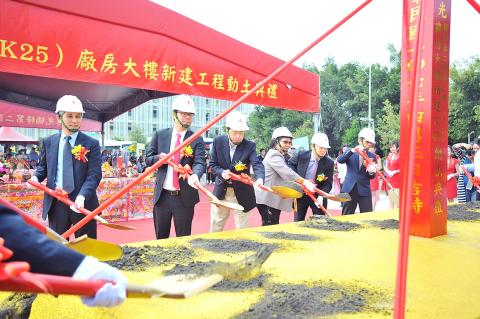Advanced Semiconductor Engineering Inc (ASE, 日月光半導體) yesterday said it is investing NT$12.5 billion (US$429 million) on a new advanced fab in Kaohsiung to expand capacity, with the aim of keeping up pace with high demand for system-in-a-package (SiP) services.
The rapid proliferation of slim Internet of Things devices is driving demand for SiP packaging technology, which encloses several chips, such as microprocessors and memory chips, in a single module, the world’s largest chip tester and packager said.
“Our factories are fully utilized [even] after the consolidation of ASE and Siliconware Precision Industries Co (SPIL, 矽品精密),” ASE chairman Jason Chang (張虔生) told a media gathering.

Photo courtesy of Advanced Semiconductor Engineering Inc
“This proves that the concern that the combination of the two firms would undermine ASE’s customer base and reduce client orders is unfounded,” Chang said.
“We are still scouting for new land in areas adjacent to existing plants to further expand capacity,” Chang said.
The company early this year said it has seen capacity become scarce, due to improving demand for a wide range of products and a boost from rising demand for cryptocurrency mining machines.
The capacity at another new fab, dubbed K24, has been fully booked and the factory would not start manufacturing any products in the first quarter of next year, ASE said.
The latest K25 fab is expected to start production in about two years, primarily for SiP services, ASE said.
K25 would generate NT$10 billion in revenue when it is 100 percent utilized, the company said.
ASE and SPIL shares are scheduled to be delisted from the local stock market on April 30, while the new entity created by their merger, ASE Industrial Holding Co (日月光投資控股), shares are to be traded on the nation’s main board on the same day.
The two companies are to continue to operate independently under their current management teams.
The merger helps enlarge the company’s scale and cultivate talents, giving an edge to combat industrial entrants, Chang said.
Asked about the growing threat from Chiense rivals, Chang said that China might have deep pockets to invest on the semiconductor industry, but it cannot create a big pool of talent overnight.
ASE and SPIL have 68,000 personnel in total.
Commenting on trade tensions between the US and China, Chang said he believes that it will end “peacefully.”
US President Donald Trump uses the trade deficit and tariffs against China as bargaining chips to negotiate better deals, he said.
The trade dispute between the world’s two largest economies will not constitute a sufficient reason for ASE to build a new labor-intensive production line in the US, given the lack of workers, Chang said.
Instead, ASE prefers investing on building an operation with strong technological capabilities, such as a chip testing lab that ASE operates in California, he said.
Commenting on whether ASE would join the trend of listing the shares of its subsidiaries on China’s A-share market, Chang said it is evaluating the possibility of spinning off new businesses and trading their shares in China.
Hon Hai Precision Industry Co (鴻海精密), a major assembler of Apple Inc’s iPhones, has won approval from Chinese regulators to list the shares of its subsidiary Foxconn Industrial Internet Co (富士康工業互聯網) on the A-share stock market.

The Eurovision Song Contest has seen a surge in punter interest at the bookmakers, becoming a major betting event, experts said ahead of last night’s giant glamfest in Basel. “Eurovision has quietly become one of the biggest betting events of the year,” said Tomi Huttunen, senior manager of the Online Computer Finland (OCS) betting and casino platform. Betting sites have long been used to gauge which way voters might be leaning ahead of the world’s biggest televised live music event. However, bookmakers highlight a huge increase in engagement in recent years — and this year in particular. “We’ve already passed 2023’s total activity and

BIG BUCKS: Chairman Wei is expected to receive NT$34.12 million on a proposed NT$5 cash dividend plan, while the National Development Fund would get NT$8.27 billion Taiwan Semiconductor Manufacturing Co (TSMC, 台積電), the world’s largest contract chipmaker, yesterday announced that its board of directors approved US$15.25 billion in capital appropriations for long-term expansion to meet growing demand. The funds are to be used for installing advanced technology and packaging capacity, expanding mature and specialty technology, and constructing fabs with facility systems, TSMC said in a statement. The board also approved a proposal to distribute a NT$5 cash dividend per share, based on first-quarter earnings per share of NT$13.94, it said. That surpasses the NT$4.50 dividend for the fourth quarter of last year. TSMC has said that while it is eager

‘IMMENSE SWAY’: The top 50 companies, based on market cap, shape everything from technology to consumer trends, advisory firm Visual Capitalist said Taiwan Semiconductor Manufacturing Co (TSMC, 台積電) was ranked the 10th-most valuable company globally this year, market information advisory firm Visual Capitalist said. TSMC sat on a market cap of about US$915 billion as of Monday last week, making it the 10th-most valuable company in the world and No. 1 in Asia, the publisher said in its “50 Most Valuable Companies in the World” list. Visual Capitalist described TSMC as the world’s largest dedicated semiconductor foundry operator that rolls out chips for major tech names such as US consumer electronics brand Apple Inc, and artificial intelligence (AI) chip designers Nvidia Corp and Advanced

Pegatron Corp (和碩), an iPhone assembler for Apple Inc, is to spend NT$5.64 billion (US$186.82 million) to acquire HTC Corp’s (宏達電) factories in Taoyuan and invest NT$578.57 million in its India subsidiary to expand manufacturing capacity, after its board approved the plans on Wednesday. The Taoyuan factories would expand production of consumer electronics, and communication and computing devices, while the India investment would boost production of communications devices and possibly automotive electronics later, a Pegatron official told the Taipei Times by telephone yesterday. Pegatron expects to complete the Taoyuan factory transaction in the third quarter, said the official, who declined to be